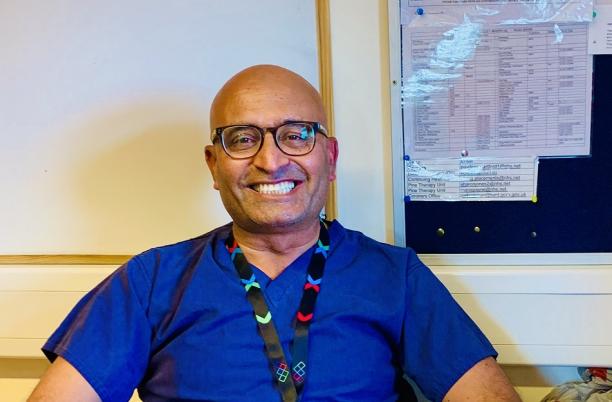

Dr Naseem Tariq, a cancer surgeon and specialist working in acute care, became ill with COVID-19 during the early days of the pandemic. His condition deteriorated very quickly, until he was placed on an end of life pathway. In his own words, “there was no hope that I was going to survive”.
Despite the odds he recovered, and the experience of coming face-to-face with his own death has changed his approach as a doctor. “As an end of life patient myself I felt that people never really took the time to understand what was going on with me” he says. “They asked a few standard questions, and then walked away – leaving me as a patient in a very lonely place.”
A different perspective
Dr Tariq became aware of ellenor, a hospice in Kent, through a connection with one of their staff, Dr Sheraz Majeed. After his life-changing experience, he decided he wanted to work in palliative care.
“I wanted to broaden my perspective and widen my experience, so I decided to apply to work in palliative medicine” he says. “Not working as a surgeon, but as a physician looking after patients at the end of their lives – because I have been there, and I know how lonely it is.”
He describes his move to ellenor as “very therapeutic” and having “offered the new perspective he was looking for”. But he’s also been able to carry over his experience of working in an acute setting to its palliative counterpart, a radically different environment.
“Hospital doctors don’t know what happens to their patients when they become end of life and are transferred out of an acute setting. There’s a lot of pressure on the acute doctors, so they have no choice but to quickly turn their attention to the next patient in need of acute care.
Care centred on the patient
“Being at ellenor now, I see that perspective – I see those patients as human beings who are no longer in the hospital, but still have a journey left in them. I see them embark on that journey with us, and witness first-hand how much value we add – how much quality of life we enable them to have.”
A major difference is having more time to spend with patients. “Here, I can spend an extra half an hour with a patient. That’s what hospices can do that nobody else can. But at the same time, it’s a very different type of practice. It has a whole new impact on your personality. It changes you as a human being” he says.
Dr Tariq explains that in some cultures there is little or no awareness of what hospice care is. “I come culturally from a background where there is no concept of hospice or nursing homes. In Asian and Middle Eastern culture, people tend to have larger, joint families where they keep their elderly. Their older relatives live with them, and they die at home. But as civilization develops, I’m seeing even those families and cultures struggle.”
A multi-ethnic hospice
Gravesend, where ellenor is based, is profoundly multicultural, with a large Asian population and thriving Afro-Caribbean communities. Dr Tariq wants to pave the way for a new breed of “multi-ethnic hospice”, by making palliative care teams more diverse, and raising awareness of what hospices can offer in local communities.
“I think the average Asian family isn’t aware of what a hospice does – it’s an unknown idea to them. But if they know that there are two Asian doctors working here, we can talk to them about it, and we can share our experiences. If families feel supported – whichever religion they’re from – and know that they can get meals of their choice and tailored care, that’s important to us.”
“I am not aware of many diverse hospices. ellenor can be the leader of that, and can make a statement. We can reach out to all communities, even the ones that no one else can. These things don’t increase costs, but they do require a shift in focus in terms of how you approach people. We could go to the local mosque, hand out brochures… tell them that we’re taking pride in looking after the Muslim community.”
“This is the only hospice that I know, and I think it’s the perfect place to be. It’s a pleasant environment, the right kind of place – with the right kind of people. It’s a good cultural mix, and, when someone comes to us – whose daughter isn’t here, or who doesn’t have a child, or who has lost their husband – we give them the space they need. We work with them, and we give them choices, support. I believe they feel that we are their family.”
